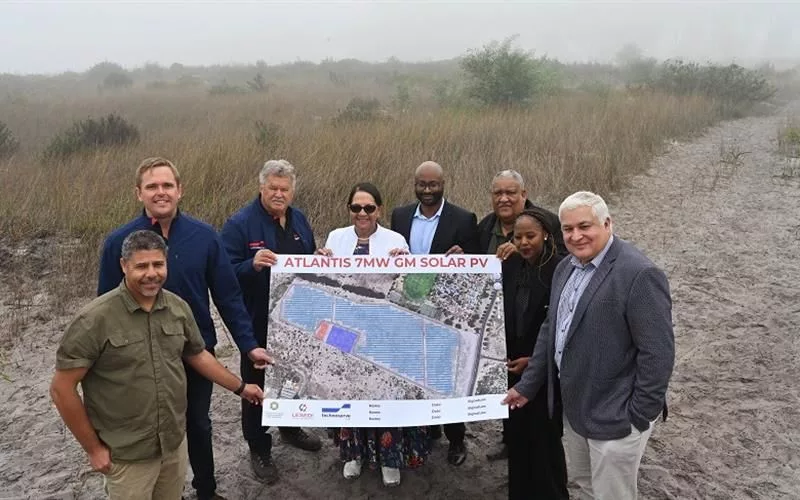Cape Town is taking a bold step towards energy sustainability with its flagship Atlantis Solar PV plant. The 7 MW solar facility, owned and managed by the city, is set to begin construction in August 2024 and will be a beacon of green energy. The Lesedi Technoserve Consortium is handling the project’s engineering, procurement, and construction, and the plant is expected to directly supply the city’s electrical network with the 7 MW of electricity it generates. This large-scale renewable energy endeavor is also expected to promote job creation and contribute towards Cape Town’s net-zero carbon emissions goal.
What is the Atlantis Solar PV plant in Cape Town?
The Atlantis Solar PV plant is a 7 MW solar facility linked to the grid, owned and managed by the city of Cape Town. It is the inaugural project in a projected series of similar developments scheduled to be deployed throughout the metropolitan area in the near future. The Lesedi Technoserve Consortium is handling the engineering, procurement, and construction of this beacon of green energy. The project is set to commence construction in August 2024.
A Bold Step Towards Energy Sustainability
As the sun rises on August 2024, the vibrant city of Cape Town prepares to undertake a bold journey towards energy stability and ecological responsibility. The city administration has granted a contract for the creation of its flagship solar photovoltaic (PV) plant, an enormous project nestled in Atlantis. This nascent foray into renewable energy, set to be finished in a year, assuming everything goes as planned, signifies a major step in the city’s pledge to minimize power disruptions and pave the way for a more sustainable future.
The Dawn of Renewable Energy Era in Cape Town
The Atlantis Solar PV plant, the city’s pioneering 7 MW solar facility linked to the grid, is the inaugural project in a projected series of similar developments scheduled to be deployed throughout the metropolitan area in the near future. The Lesedi Technoserve Consortium, a renowned group celebrated for their expertise and dedication to eco-friendly technologies, has been chosen to handle the engineering, procurement, and construction of this beacon of green energy.
Now in its meticulous design phase, the project anticipates initiating the transmission of its inaugural power into the grid by the end of 2025. Benefiting from its strategic location near a key substation, the plant is expected to directly supply the city’s electrical network with the 7MW of electricity it generates. This large-scale renewable energy endeavor, owned and managed by the city, will undoubtedly leave a lasting footprint on Cape Town’s energy map.
Economic Implications and Job Creation
However, the Atlantis Solar PV plant is more than just a solution for energy; it is a vital economic resource. The City’s Mayoral Committee Member for Energy, Councillor Beverley van Reenen, highlights the project’s capability to stimulate employment opportunities. Designed to be an engine for economic development, the Atlantis initiative is predicted to promote job creation and generate green employment across a variety of skill spectrums.
The Atlantis Solar PV facility is a tangible representation of Cape Town’s Energy Strategy 2050 Vision: “Energy security for a prosperous Cape Town.” It embodies the city’s dedication to harness innovative energy sources, operate a future-ready utility, and optimize energy usage. As the City wrestles with steep escalations in Eskom prices, the Atlantis Solar PV plant is positioned to be an economically viable solution, with the goal of producing affordable, dependable electricity at prices lower than Eskom’s rates.
Towards a Carbon-Neutral Future
Another milestone in the city’s green journey will be the significant contribution of this project towards the City’s objective of achieving net-zero carbon emissions in municipal buildings by 2030. By compensating for the electricity usage in municipal buildings, the renewable energy produced by the Atlantis Solar PV project will effectively diminish the carbon emissions associated with the City’s operations.
As Cape Town marches assertively towards a greener future, the Atlantis Solar PV plant emerges as a symbol of hope and a physical embodiment of the city’s dedication to renewable energy and energy security. This groundbreaking project, set to commence construction in August 2024, is an encouraging harbinger of the city’s ambitious Energy Strategy 2050 vision. It serves as a reminder that the path to sustainability is lined with innovation, commitment, and the bravery to venture into unexplored territories.
1. What is the Atlantis Solar PV plant in Cape Town?
The Atlantis Solar PV plant is a 7 MW solar facility linked to the grid, owned and managed by the city of Cape Town.
2. Who is handling the engineering, procurement, and construction of the Atlantis Solar PV plant?
The Lesedi Technoserve Consortium, a renowned group celebrated for their expertise and dedication to eco-friendly technologies, has been chosen to handle the engineering, procurement, and construction of this beacon of green energy.
3. When is the construction of the Atlantis Solar PV plant expected to commence?
The project is set to commence construction in August 2024.
4. What is the economic significance of the Atlantis Solar PV plant?
The Atlantis Solar PV plant is designed to be an engine for economic development, promoting job creation and generating green employment across a variety of skill spectrums.
5. How will the Atlantis Solar PV plant contribute towards Cape Town’s net-zero carbon emissions goal?
By compensating for the electricity usage in municipal buildings, the renewable energy produced by the Atlantis Solar PV project will effectively diminish the carbon emissions associated with the City’s operations, contributing towards Cape Town’s net-zero carbon emissions goal.
6. What is Cape Town’s Energy Strategy 2050 Vision?
Cape Town’s Energy Strategy 2050 Vision is “Energy security for a prosperous Cape Town.” It embodies the city’s dedication to harness innovative energy sources, operate a future-ready utility, and optimize energy usage. The Atlantis Solar PV plant is a tangible representation of this vision.












